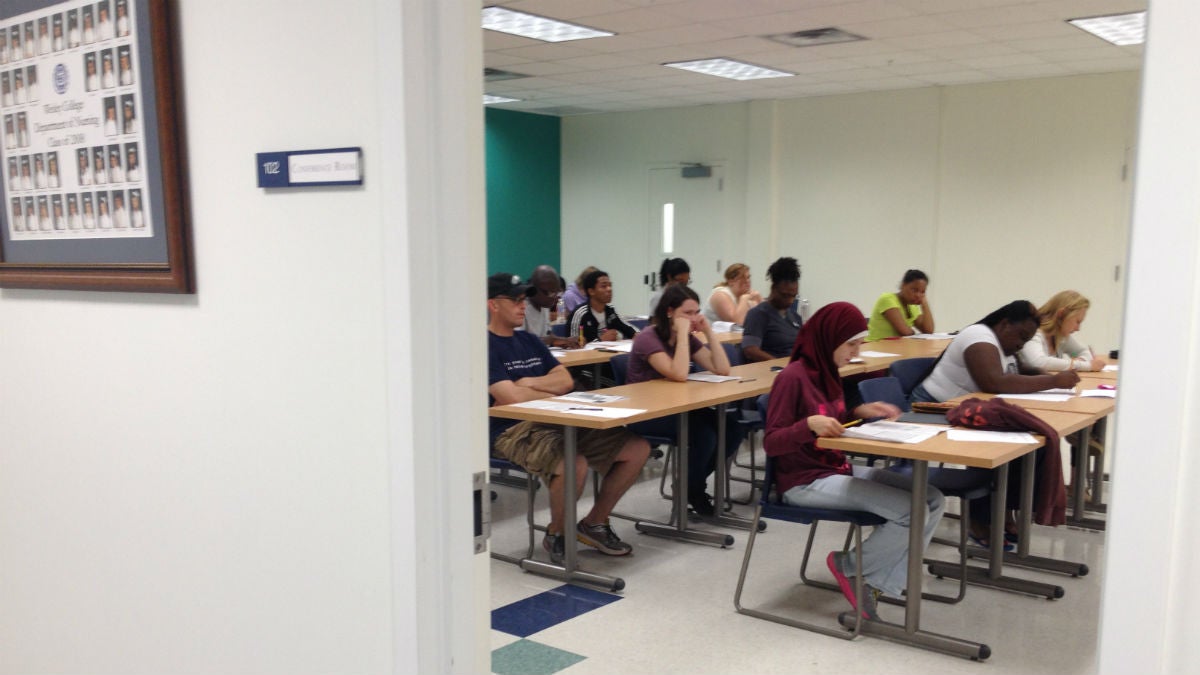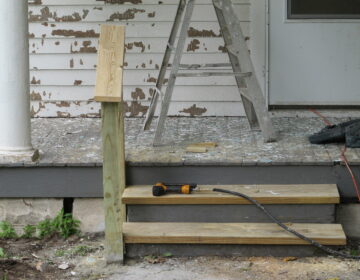First Year, First Generation: Consider the placement test
Listen
Students take a nursing school placement test at Wesley College (Avi Wolfman-Arent for WHYY)
This article is the second story in our First Year, First Generation series. For an introduction, click here.
You can listen to Part 3, Part 4, Part 5, and Part 6 by clicking on the links.
A lot of ink has been spilled recently on the topic of standardized tests.
Colleges are dumping the SAT. States are dumping the PARCC and Smarter Balanced tests. Parents are dumping on the whole notion of high-stakes exams as a tent pole of educational policy.
There’s one category of standardized test, though, that garners relatively little attention. This despite the fact that millions take them annually and that the stakes attached are much higher for students than many of the higher-profile exams.
I’m talking about the humble college placement exam.
For decades, these tests have determined the academic starting point for freshmen all over the country. Yet, historically, few wondered whether they were effective or even necessary. Neither did I—at least not until a few weeks ago.
Here at NewsWorks/WHYY we’re midway through a series called “First Year, First Generation.” The project follows five, first-generation college students from high school graduation to the last day of their freshmen years.
Recently, I asked the students to describe their experiences taking placement tests. The answers surprised me.
‘Crying at the computer’
Only one of the five students spent any time preparing for a placement test. And three of the students scored poorly enough on a placement test that they would have to at least consider taking remedial math.
“It was shocking,” said Sean Ryan, an incoming freshman at the University of Delaware. “Like it made me scared for college. Not just because I thought maybe this math class will be hard. I was really scared for what college is gonna hold.”
Jacki White, also an incoming freshman at the University of Delaware, freaked out in the middle of her placement test.
“I’m like crying at the computer,” she said. “I was like, ‘I’m so stupid. I’m not ready for college. I can’t do this.’”
For Josee Lazarre, who will start at the university’s Georgetown campus this fall, the letdown didn’t hit until after she finished the exam.
“I feel like I let myself down,” Lazarre said. “I’m like I should have taken it more seriously.”
Roughly 20 percent of students entering four-year colleges enroll in remediation, so it’s not as if this is an uncommon outcome. It can, however, be a jarring one for the students who experience it.
“They thought they were doing OK based on their high school background and then they got this signal that you’re not good enough,” says Judith Scott-Clayton, a researcher at Teachers College, Columbia University.
Testing the test
A significant portion of the students who place into remediation likely need it. They simply aren’t ready for college-level coursework.
But what if the tests are partly to blame? What if the tests are oversubscribing remediation?
Scott-Clayton and her colleagues set out to test that theory and, in 2012, released two influential studies stating that, indeed, the tests were placing too many students in remedial classes.
They discovered that other indicators like high school GPA did a better job predicting student outcomes, and that between a quarter and a third of students placed in remediation could have gotten a ‘B’ or better in credit-bearing courses.
This type of misplacement can have serious consequences because students who enter remediation often never escape it. “It’s not so much that they’re failing those classes,” Scott-Clayton says. “It’s that they’re not sticking around, sometimes getting discouraged.”
As a result, students who take remedial classes are considerably less likely to graduate.
Scott-Clayton’s findings helped set off a wave of reform, particularly among community colleges. So strong was the wave, that ACT announced this summer it will discontinue its popular placement test — once taken by more than 2 million students a year.
Public universities have also heeded the call. University of Delaware happens to be one of them.
Delaware changes course
For about 30 years, the school gave entering freshmen a single, 20-question test to determine their math placement. Last year, though, the university rolled out a new, computer-adapted test called ALEKS.
ALEKS is longer than its predecessor—one student told me it took over two hours—but university officials also think it’s more accurate. More important, students can take the test up to three times, as long as they take an online refresher course between each attempt.
Last year, 40 percent of students re-took the test, according to John Pelesko, an interim dean with the College of Arts and Sciences and the former head of Delaware’s math department. On average, those took the test again improved their scores by 19 percentage points.
Sean Ryan was among those who took advantage of this new, more forgiving placement protocol. He completed a five-hour, online course and retook the placement test. His score improved by 10 percent and is now eligible for pre-calculus, a credit-bearing course.
Jacki White will also avoid remediation. She wants to major in the arts and can fulfill her math requirement with a special course designed for students in the humanities. If her focus shifts she may be in trouble, since many majors require a more advanced math credit. But for now, she’s OK.
Josee Lazarre is in a more precarious situation. She will report to remedial math on her first day of college. Her teacher will give all the students a six-question quiz. If Lazarre gets four questions right, she’ll be instantly promoted to pre-calculus. If not, she’ll remain in remediation. The teacher told me that about a tenth of the students pass this mini-test every year.
Delaware is just one of many schools tinkering with its placement system—trying to make it more accurate and student-friendly while ensuring freshmen land in classes they can handle. For Sean Ryan, the new placement protocols worked exactly as they should. Ryan retook the test, did better, and avoided the remediation trap.
‘Maybe my grades won’t be good enough’
But when I talked to him more than a month later, Ryan said the whole placement test experience had left a scar. He wasn’t as enthusiastic about college as he’d been at the end of high school.
“I’m still gonna go,” he said. “I’m still gonna try my hardest. But I thought it would be more fun and now I’m thinking to myself it’s not gonna be all that much fun.”
Perhaps the test was a necessary wake-up call. Then again, studies show that first-generation students often lack self-confidence. They’re more likely to question their academic abilities, their social skills, and their leadership qualities. Little setbacks—like, say, a bad test score—can amplify those doubts, especially when it’s the first test a student takes.
“Maybe my grades won’t be good enough,” Ryan said to me, recalling his thoughts after taking the placement test. “Maybe I’ll just go to a technological school or something—something easier.”
I thought perhaps Ryan was being hyperbolic, so I asked: Did he really consider technical school?
He said he did.
“I don’t think it’s gonna happen for real, but it’s still in the back of my head.”
WHYY is your source for fact-based, in-depth journalism and information. As a nonprofit organization, we rely on financial support from readers like you. Please give today.





